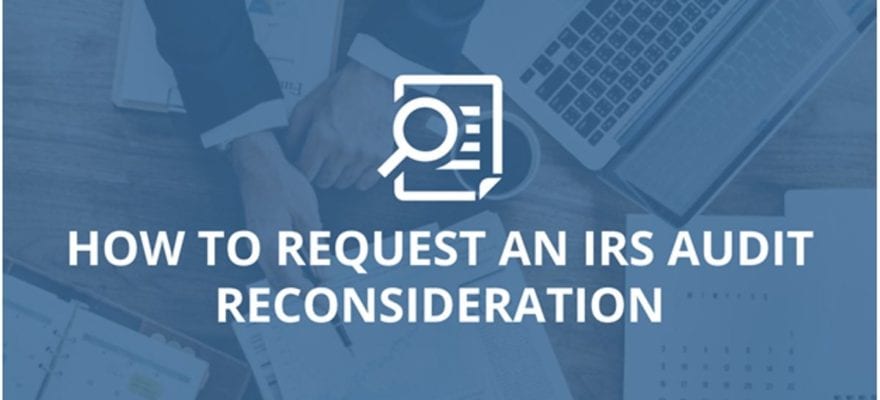Has the IRS audited one of your tax returns and determined that your tax liability is bigger than you presented? Or did it create a return for you after you filed to file and present you with a large tax bill? In either case, you can challenge the result by requesting an IRS audit reconsideration.
The audit reconsideration process allows U.S. taxpayers to re-examine the results of an audit where a tax credit was reversed or additional tax was assessed. If you were unable to file an administrative appeal or escalate your case to the Tax Court for any reason, requesting an audit reconsideration gives you another chance to present your case.
Can Anyone Request an Audit Reconsideration?
While any taxpayer who disagrees with the results of an IRS audit or tax return can request a reconsideration, your case should meet the following criteria for the government to reopen it.
- You disagree with the new tax liability.
- You have new information, such as receipts or banking information, about your income or expenses. This information must be related to the audited tax year.
- You did not send the IRS your financial information or appear for the audit meeting.
- You did not get the audit report because you moved.
If any of the following circumstances apply, you can’t request a reconsideration:
- You already paid the new or adjusted tax bill. If this is the case, you have to submit an amended tax return and request a refund.
- You already agreed to pay the amount owed and entered into a payment arrangement such as an offer in compromise.
- The assessment was made after you entered into a closing agreement or signed a waiver.
- The tax debt is the outcome of final partnership item adjustments under the Tax Equity Fiscal Responsibility Act.
- The U.S. Tax Court has made a final determination on how much tax you owe.
How to Request an Audit Reconsideration
After you receive the audit report and identify the changes that you believe to be inaccurate, your next step should be collecting documentation that supports your position. (It is important to note that this information must not have been part of the original audit.) You then write a letter to the IRS office that last corresponded with you, explaining why you are requesting reconsideration, and provide documentation like the following:
- A copy of the audit report
- Copies of invoices, receipts, canceled checks, and other information that supports your argument.
In general, the IRS will respond to audit reconsideration requests within 30 days. Potential outcomes are:
- Acceptance of the new information and removing the previously assessed tax
- Acceptance of some of the new information and partially reducing the tax liability
- Concluding that the new information didn’t support your position and letting the original assessment stand
If you accept the results of the reconsideration, you can pay the balance in full or, if doing so would cause financial hardship, request an IRS payment arrangement. If you disagree with the results, your next step is to request a meeting with the Office of Appeals. At this stage, you should consider seeking representation by an enrolled agent, CPA, or experienced tax attorney.
Contact a New Jersey Tax Law Attorney
Although you may be positive that you are eligible for an IRS reconsideration request, bear in mind that the IRS is not obligated to review or accept it. The government has total discretion over how it handles each request. For this reason, you should work with a tax attorney to maximize the chance of the IRS reviewing and hopefully accepting your information.
At Paladini Law, we provide qualified and experienced support for New Jersey residents dealing with the unfavorable outcome of an IRS audit. Attorney Brad Paladini has assisted many taxpayers throughout the state in taking advantage of the second chance that the audit reconsideration process offers. He will help you determine whether you are eligible for reconsideration and if so, work with you to present a compelling case.
If your claim is rejected and you accept the outcome, Attorney Paladini will help you negotiate an offer in compromise or other tax debt payment plan that you can afford. Alternatively, if you disagree with the reconsideration results, he can advise you on whether you should escalate the matter to the Office of Appeals and represent you at the subsequent hearing. To schedule a consultation about your federal tax situation, please contact us or call 201-381-4472.
Also Read:



